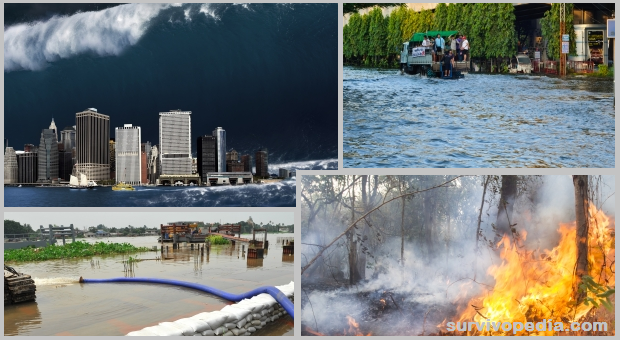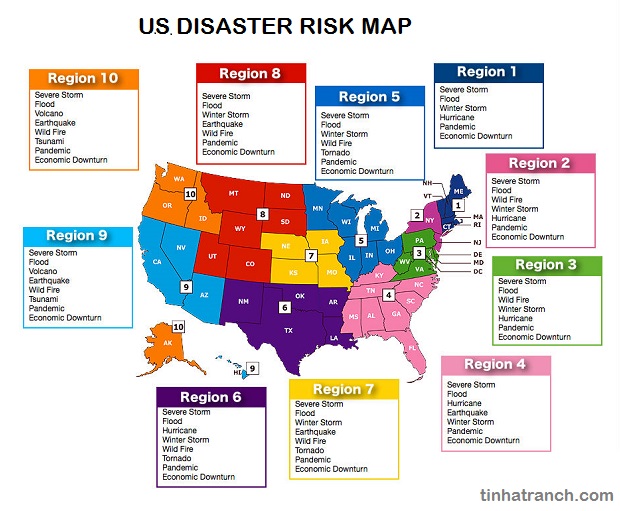Regardless of where you live in the US, or for that matter the world, chances are good that you’re in at least some danger of experiencing a disastrous weather event.
In eastern coastal areas such as Florida, Louisiana, Texas, Georgia or the Carolinas, hurricanes are the major issue. In the plains areas, tornadoes strike fear in the heart of citizens. Floods, wildfires, heat waves, droughts and lightning plague other areas.
Today we’re going to talk about how to prep for summer storms and disasters.
Stockpile List
Regardless of the type of disaster that you’re preparing for, there are some staples that you need to stockpile in advance. Have these on hand at all times and rotate them to keep them fresh.
- Water. Enough for at least 1 gallon per person per day.
- Non-Perishable Food. Canned goods, dried meats, instant coffee and creamer, instant milk, granola bars and whatever else your family (and pet) likes. Store a variety and make it nutritious and energy-packed.
- Plastic Cutlery, Paper Towels, Bowls and Plates. You may not be able to wash dishes, so plan for throwaway items.
- Toilet Paper. Enough said.
- Charcoal or Propane, and a Grill. You’ll want a place to cook and to sterilize water, if need be.
- Medications. Get a refill on your prescriptions if possible and stock up on over the counter meds that you take on a regular basis.
- First-Aid Kit. Stock all of the necessary items that we’ve talked about in other articles.
- Doc Box. Have all of your necessary personal information such as birth certificate, social security card, marriage certificate, bank info, insurance, etc. in a fire-proof, water-proof box.
- Cash. Chances are good that ATMs aren’t going to work so you need to have enough cash to buy any incidentals, or to get out of town.
- Candles and Flashlights
- Batteries for Flashlights and favorite toys if you have kids
- Battery-Operated, Solar or Crank Weather Radio
- Heavy Gloves for after-disaster cleanup
Hurricanes
That gives you plenty of time to prep for one, but if you wait until the 11th hour, chances are good that you won’t find the food and water that you need to get you through days or weeks without power.
Prepare ahead so that you can spend the final days getting your home and vehicles ready instead of fighting over the last can of tuna at the local grocery store. Here are some of the major things that you need to stockpile. Plan for two weeks without power, at least.
Use the food in your fridge and freezer first because the fridge contents will be bad in about a day and the freezer will be defrosted in a couple of days. In addition to the standard list, there are a few other items that will come in handy in the event of a hurricane.
- Fuel. Fill your cars up and keep them topped off until the storm comes. Fill your generator and your gas cans. Don’t wait until the last minute because fuel may run out and trucks stop running within a day or two of the storm.
- Plywood or Hurricane Shutters. This is going to fly off the shelves. Buy it well in advance and have it ready for your windows.
- Rain Gear.
Tornadoes and Wild Fires
Tornadoes and wild fires, though different in form, are similar in nature and require similar preparation. They strike without warning and are lethal. You’ll have very little time to get to safety so you need to have all of your supplies in a safe place such as a cellar. Here are a few other things that you need in addition to the list.
- A safe place to go. A shelter of some sort that you can get to quickly in case you get caught unaware. Have a plan for home and work.
- Alternate living arrangements. If your home is destroyed by fire or a tornado, you may need a place to stay for several months until it’s habitable again, or until you find another home.
- A few months’ wages. This can be tough, especially if you’re living paycheck to paycheck, but if you live in a tornado- or wildfire-prone area, your place of employment may be destroyed. Having some money in the bank to pay your bills will save your bacon until you can find another job.
Droughts
Droughts are a special beast because nobody knows how long that they will last. Pasture dies and grazing animals have nothing to eat. Water is rationed and if you’re on a well system, you may run out of water. The main concept is, of course, water conservation. Here are some tips.
- Collect water from under your air conditioner and have water tanks that you use to collect rainwater throughout the year.
- If there’s no rain, the air can’t be cleaned and smog increases. Don’t fill your car clear up with fuel. This causes more smog-forming pollutants. Use public transportation to help keep smog down.
- If you farm, have an irrigation system in place. Emergency ones can be difficult to place due to emergency regulations.
- Keep yourself and your animals as cool as possible to avoid heat-related dehydration.
The best way to survive weather disasters is to be prepared. Educate yourself regarding what your geographical dangers are and get familiar with local weather alerts and emergency systems. Don’t wait until the last minute to get prepared or to learn what you have to do because by then it may very well be too late.
You’re a prepper, so prep! Oh, and please share your tips in the comments section below. Nothing compares to experience.
Learn how to prepare to survive disaster on “Conquering the Coming Collapse”.
This article has been written by Theresa Crouse for Survivopedia.
About Theresa Crouse
Theresa Crouse is a full-time writer currently living in central Florida. She was born and raised in the hills of West Virginia, where she learned to farm, hunt, fish, and live off the land from an early age. She prefers to live off the grid as much as possible and does her best to follow the “leave nothing behind but footprints” philosophy. For fun, she enjoys shooting, kayaking, tinkering on her car and motorcycle, and just about anything else that involves water, going fast, or the outdoors. You can send Theresa a message at theresa.crouse [at] survivopedia.com.





